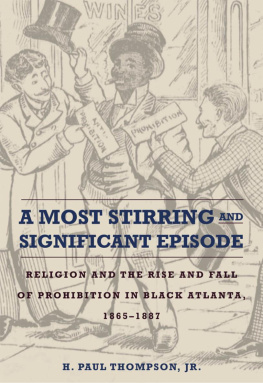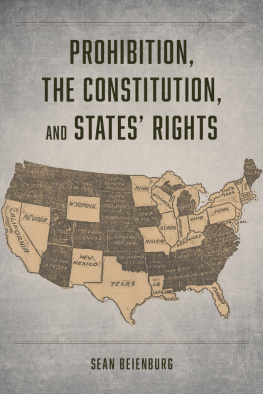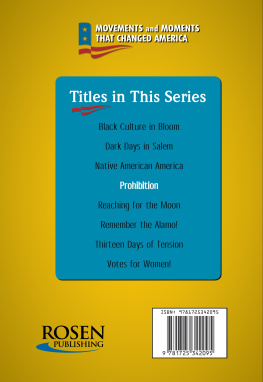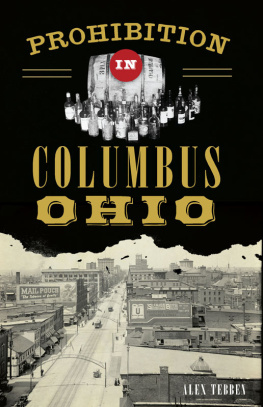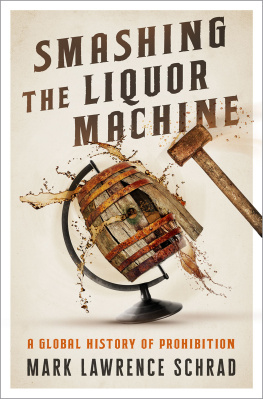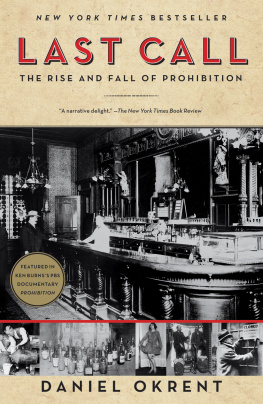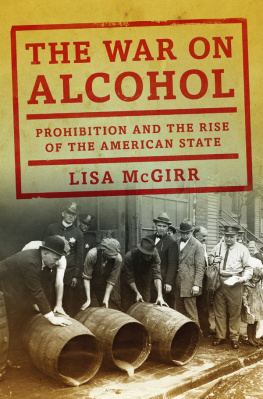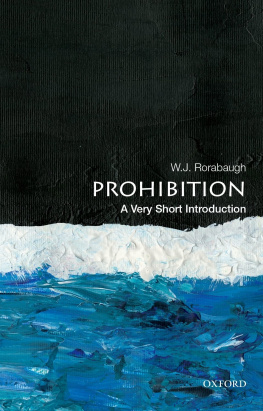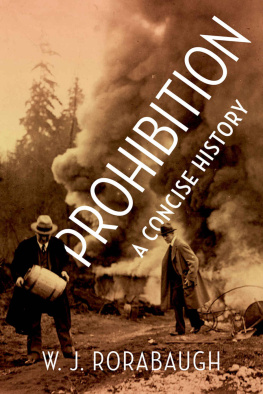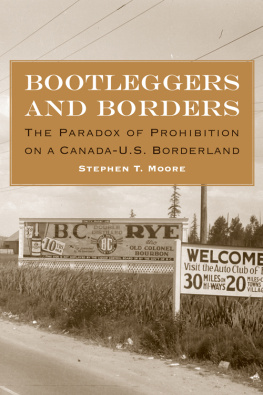2013 by Northern Illinois University Press
Published by the Northern Illinois University Press, DeKalb, Illinois 60115
Manufactured in the United States using acid-free paper.
All Rights Reserved
Design by Shaun Allshouse
Library of Congress Cataloging-in-Publication Data
Thompson, H. Paul.
A most stirring and significant episode : religion and the rise and fall of prohibition in Black Atlanta, 18651887 / H. Paul Thompson Jr.
p. cm.
Includes bibliographical references and index.
ISBN 978-0-87580-458-3 (cloth) ISBN 978-1-60909-073-9 (electronic)
1. ProhibitionGeorgiaAtlantaHistory19th century. 2. TemperanceGeorgiaAtlantaHistory19th century. 3. Temperance and religionGeorgiaAtlantaHistory19th century. 4. African AmericansAlcohol useGeorgiaAtlantaHistory19th century. 5. African AmericansReligionHistory19th century. 6. African AmericansSocial conditions19th century. I. Title.
HV5090.G4T46 2012
363.41089960730758231dc23
2012030682
To God be the Glory
Harold Thompson, in memoriam
For all you have given
Mary Thompson
Martha Bagley
Robin Rutan-Thompson
Contents
Part I
The Evangelical Reform Nexus Roots of Nineteenth-Century Temperance, 17851865
Introducing the Freed People to Temperance, 18651876
Northern Temperance Targets Southern Blacks, 18771890
Part II
Black Atlantas Efforts to Institutionalize a Temperance-Based Moral Community
Atlantas 1885 Local Option Election
Atlantas 1887 Local Option Election
Our Enterprise Flows from the Gospel of Christ
The Message Trickles South
The Trickle Becomes a Flood
Taking Ownership
The Most Enthusiastic Election Ever Held in This Country
The Dry Years, 18851887
Prohibition Revisited
This book began over ten years ago in the mind of an anxious graduate student, and as in all such endeavors, over the years I have incurred innumerable debts to many wonderful people. While the ideas and arguments within these pages are largely mine, the strength of their articulation draws on untold hours of conversation with friends and mentors and innumerable instances of editing based on their comments.
I first want to honor James Roark, the man who taught me, by example, the meaning of the phrase a gentleman and a scholar. I will always be grateful for his consummate professionalism, his wise and gentle spirit, and the liberty he granted me to explore my interests wherever they led. I will forever cherish our many conversations about my research and academia in general. Much of the credit for any clarity of writing I achieve must be attributed to E. Brooks Holifield. Dr. Holifield taught me almost everything I know about good academic writing and how to teach it. I thank Leroy Davis for suggesting I visit the Rockefeller Archives Center. It turned out to be an unexpectedly profitable lead in more ways than one.
To my mentors from afar, Jack Blocker, Jr. and David Fahey, I thank you for graciously taking me under your wing, when you did not have to, and molding me into a temperance scholar. Your generous and selfless investment in my scholarship and career truly represents the best academia has to offer.
To those who have read all (Jack Blocker, Jr., Allison Dorsey, Jack Shuler) or parts (Jacqueline Jones, David Fahey, Paul Yandle, Joseph Moore, John Thabiti Willis) of this work in one form or another and provided much generous feedback, a great big thank you! Also, thanks to the anonymous NIU Press reviewers who both praised and challenged me. I really struggled with some of your advice, but I needed it.
One of the unexpected pleasures encountered while writing this book has been to make the acquaintance of Linda Bryan, who, like myself, is a former secondary school teacher. Your enthusiasm for research, great memory, generous spirit, and incredible editing skills are truly amazing and greatly appreciated.
The number of librarians and archivists Ive worked with for over a decade now is staggering. Archivists are truly a historians best friend. Their consistent attentiveness to my ever evolvingand sometimes revolvingresearch was indispensable.
Thank you Mark, Susan, and the whole NIU Press team for your patience and kindness as I bombarded you with tons of questions. Your timely email responses made the process manageable.
A major part of writing this book has been a seemingly endless series of research trips that almost invariably ended too soon. I have traveled to over 20 archives and research libraries in over half a dozen states to pursue what was supposed to be a local research project. On most of these trips, old friends and new have graciously housed me for daysand on occasion, weeksto defray my research expenses. I owe you all many thanks for putting up with what I am sure were excessively loquacious answers to little-more-than-courteous and perfunctory inquiries about my research. My sincerest gratitude goes to Stacy and Lily Boyd, Dan and Donna Cassidy, Ken and Lori Hoogstra, Jim and Danalee Littel, Bishop David and Rose Karaya, Frank and Jenae McKnight, Rabbi George and Debbie Stern, and Georgia Williams.
I am also thankful for those organizations who believed in me enough to support financially my research: the Rockefeller Archives Center, the Emory University History Department, the Gilder Lehrman Institute for American History, the American Congregational Association/Boston Athenum Fellowship program, and North Greenville University.
In the spring of 2011 I taught an upper level seminar called Religion and Reform in Nineteenth-Century America. I had a small group of dedicated, passionate students who made the three-hour class fly by every Tuesday evening. They read through every chapter of my manuscript and bravely interrogated my thinking and the articulation of my ideas, ultimately making for a better book. You all were awesome: Sam Andrews, Kimberly Friedrichs, Anna Hoxie, Emily Hoffman, Dianna Murray, and Sarah Scott.
But most of all, I thank my parents, my Aunt Martha, and my wife, Robin, for your prayers and support. I love you all very much. I couldnt have written this book without you.
1808 First temperance society formed by Dr. Billy J. Clark and Rev. Lebbeus Armstrong in Moreau, NY
1814 The American Tract Society founded as the New England Tract Society
1816 African Methodist Episcopal Churchs first General Conference
1825 Reverend Lyman Beecher preaches Six Sermons on the Nature, Occasions, Signs, Evil, and Remedy of Intemperance
1826 American Temperance Society founded
1830 1831 Charles Finneys Rochester, NY, revival
1832 American Baptist Home Mission Society founded
1836 American Temperance Union organized on the teetotal principle
1846 American Missionary Association founded
1851 Maine passes first statewide prohibition law
1865 National Temperance Society and Publication House founded
AME missionary William Gaines arrives in Atlanta and organizes Bethel AME
The first AMA missionary, Frederick Ayer, arrives in Atlanta
1866 Storrs School opened by the American Missionary Association
1867 Frederick Ayer organizes first temperance society in Black Atlanta in the Storrs School
1869 Atlanta University opened by the American Missionary Association National Prohibition Party founded
1870 First Odd Fellows Lodge organized in Black Atlanta
1871 First Prince Hall Masonic Lodge organized in Black Atlanta

